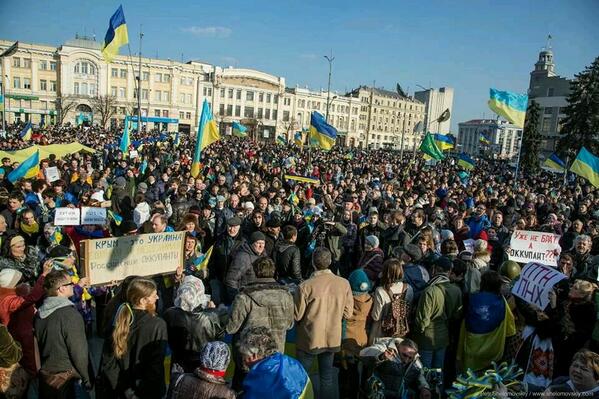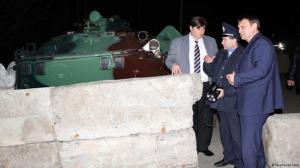By Oleksandra Indyukhova

Pro-Ukrainian rally in Kharkiv Ukraine. Majority of those present speak Russian but they feel ethnic Ukrainian
The pro-Russian movement in Kharkiv is disorganized and blocked, local officials report. There is calm in the city. Leaders of the anti-Maidan, who are currently in hiding, claim the calm is but a temporary phenomenon.
Instead of several thousand people, only several dozen — a hundred at most — get together on a daily basis. Buses no longer arrive in the city from Russian Belgorod or from Crimea or Donbas filled with people used as “extras” in the aggressive crowds that as recently as March and April moved around with no opposition from law enforcement in the center of the city and attempted in various ways to pound the “banderite” idea out of the heads of the supporters of united Ukraine.
The end to this (pro-Russian manifestation — Ed.) was brought about not by local law enforcement, but by the soldiers in the special unit of the National Guard “Jaguar,” who, on April 8, in a matter of minutes freed the seized building of the oblast state administration and arrested more than six dozen offenders.

National Guard unit - part of Ukraine's Ministry of Interior
Imperceptible clean-up
The Kharkiv anti-Maidan must not be considered “the only force,” Oleg Avdeyev, one of its coordinators, said in an interview with DW. He believes that more than 160 pro-Russian activists have been detained in the city since mid-April. “We haven’t been able to find many of them,” he said. Local law enforcement has “deactivated” most of the leaders of the movement. Several have been detained, others were forced to flee or go into hiding.
The leader of the public organization “Russian Vostok,” Anton Guryanov, gave a television interview from his hiding place to one of the pro-Russian internet portals. He claimed that in Kharkiv “subtle and quiet repression is taking place,” not only on the part of police, but also by so-called “black men” who are abducting his associates. The only proof of the existence of these “black men” is a YouTube video, where unknown men in masks and black uniforms “warn all separatists.”
The Kharkiv police and the city administration claim not to know of such “avengers.” Instead, they point to the “success of their warnings to separatists.” In the two weeks before the May holidays, when Kharkiv was expecting all kinds of provocations and disturbances, the city law enforcement reported almost daily on the detention of Russians, the residents of Crimea, of Donbas and the Caucasus, who had weapons, special equipment, and Molotov cocktails. There were also reports about the detention of people who were connected to the financing of the rebellion against the “Kyiv junta.”
Governor Ihor Baluta (left) at a roadblock
Almost 200 detained
The governor of the Kharkiv Oblast Ihor Baluta in an interview with DW stated that in just six weeks almost 190 people have been detained. “We tracked their network and have taken steps to make sure Kharkiv remains peaceful. Also, we have reinforced the borders of the Kharkiv Oblast with the Donetsk and Luhansk oblast. There are 36 roadblocks now,” he said. In addition, Baluta gives reasons for the change in behavior on the part of the Kharkiv police, who still in April did not want to follow the orders of the new Kyiv authorities.
“It wasn’t easy and it succeeded after several personnel changes. Inside the police departments a group of people appeared who were followed by others,” Baluta notes.
The fact that the local government has succeeded in bringing the anti-Maidan to a deadlock is confirmed even by Anton Guryanov. However, he believes Kharkiv Mayor Hennadiy Kernes, the leader of the local branch of the Party of Regions, played an important role. Kernes still in February was one of the founders of the so-called “Ukrainian Front,” an organization that was to become “the answer to the Kyiv Maidan. “He could have been a hero of Kharkiv,” Guryanov says.”But eventually, when the front disintegrated, he took a conciliatory position and “betrayed” the protest he says.
As previously reported, an assassination attempt was made on the Kharkiv mayor in April. Currently Kernes is recuperating in a hospital in Israel, and in his interviews states the he has “always advocated and will continue to advocate for the unity of the country.”
Experts agree that the pro-Russian movement in Kharkiv really has declined. Even though the leaders of the local anti-Maidan promise that a “referendum” will be held in the Kharkiv Oblast, and that “Novorossiya” will be created (the large portion of Ukraine Putin wants to “return” to Russia — Ed.). So far, these are threats only. “These ideas will not be accepted in Kharkiv,” says political scientist Oleksandr Romanyuk. “There is a different society here. There are more ethnic Ukrainians here than in the Donbas — some 75% — and less unemployment,” he says.

Harkiv
Political Scientist Halyna Kuts believes the situation in the Kharkiv Oblast will depend on events in neighboring Donbas. Peace in Kharkiv also depends on how quickly the government, through its information and outreach efforts, succeeds in pulling the people of Donbas out of “their separatist stress.” “If Donbas suddenly breaks off, the same can begin in Kharkiv,” she says.


No comments:
Post a Comment